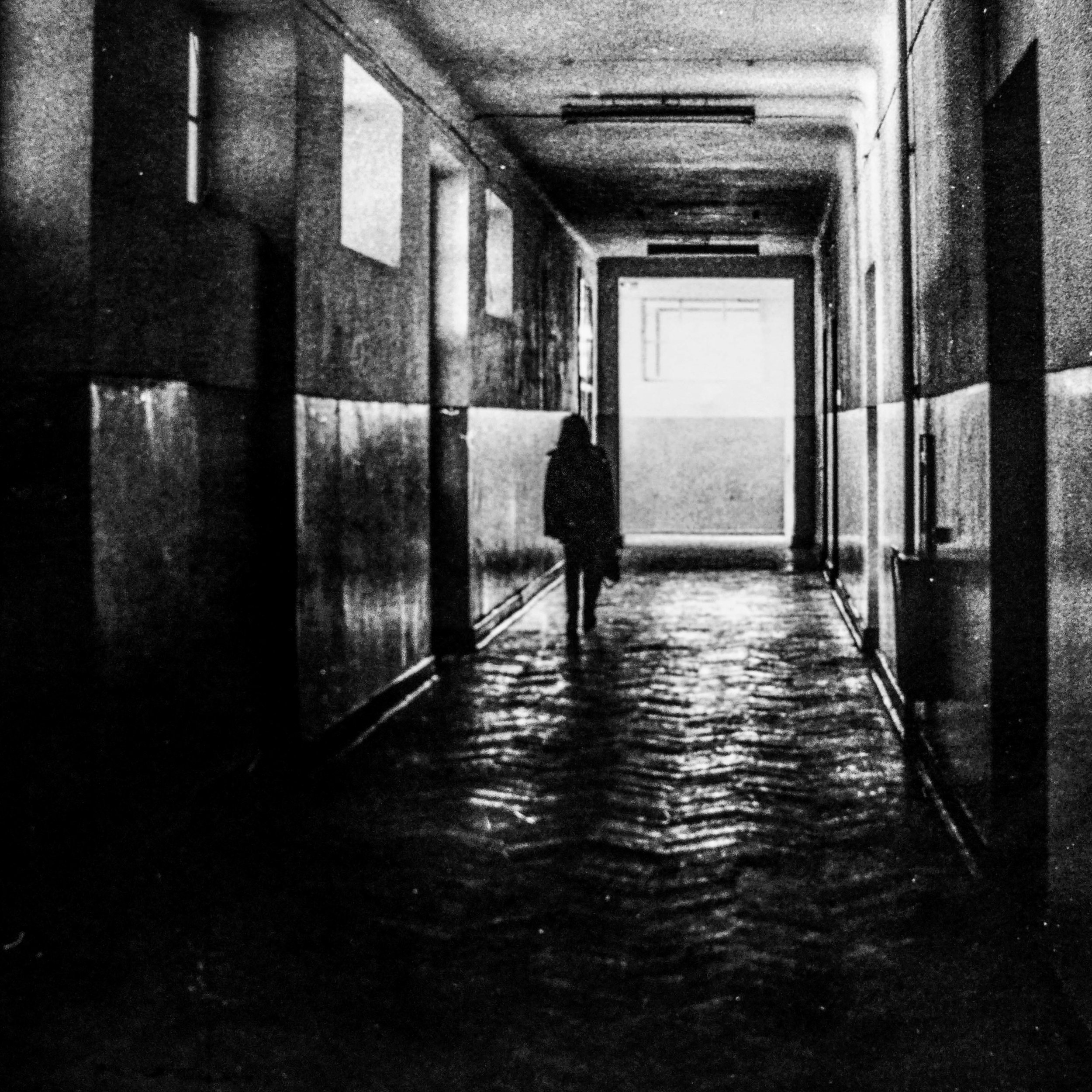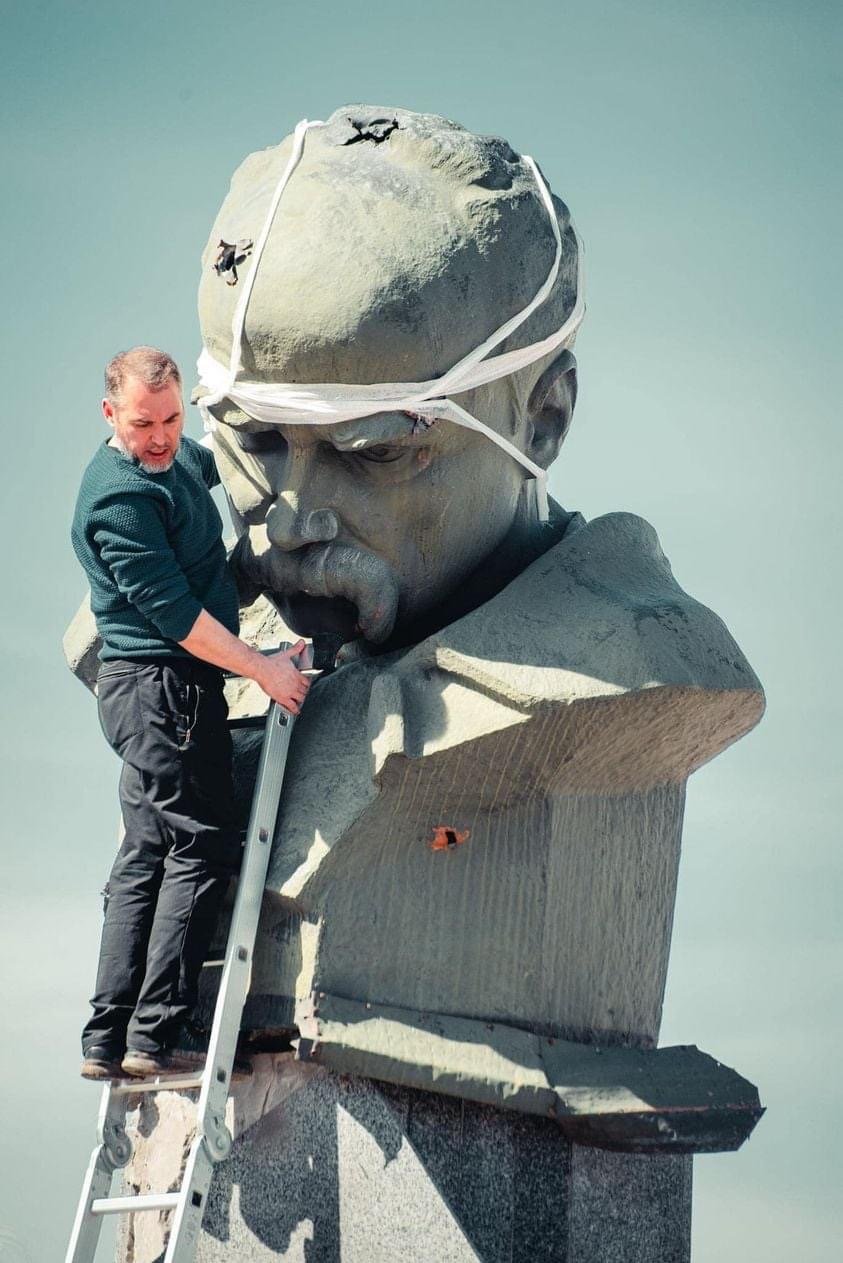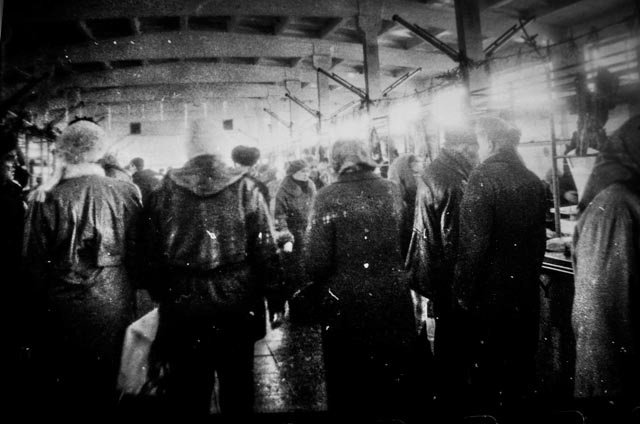(mbfitzmahan. Hallway-Lesya Ukrainka University. Film Photo. Lutsk, Ukraine. 1997.)
“Just take the Number 8 bus,” the secretary said. “You’ll have no trouble getting home.” “But all the buses look alike,” I pleaded. “Don’t worry. You won’t get lost,” she said with a charming, yet dismissive smile. “Just look for the number 8 bus.”
Navigating the dark hall to the street, I pulled open the massive wood door. It was October and a freezing wind blasted in from the east seeking me out after its long journey from the Eurasian steppes. It found me unprepared in my modest wool coat.
I worked my way down the icy stairs, walked a block, and found the bus stop. Step one accomplished.
Next, I looked for the Number 8 bus. A gasoline smell sputtered to a stop. I ran to the front of the vehicle and on the pane above the windshield, I saw the important number. Number 8. Step two completed.
Following the dark coats up the metal steps and onto the bus, I put a handful of kopecks into the outstretched wrinkled hand of the driver. He didn’t look up. I didn’t look at him, either. A seat waited for me in the back and half lidded eyes watched me as I tripped over packages and struggled down the aisle to the rear.
“Please, God, let this be the right bus.” The Number 8 bus rattled. It rattled down the road shaded by canyons of five-storied look-a-like buildings.
Brown, black, and grey coats huddled over cracked leather seats. A chalky white knuckle held onto a monster burlap bag. The woman that went with the hand had a face that looked much younger, but her hand told tales of hard work – many washed dishes and many buckets of dirty clothes.
The bus stopped. Once. Twice. Three times.
And then the Number 8 bus turned. It turned left. What? The Number-8-real-bus should have gone straight, down the street toward my five-story building, the university’s Khrushchyovka.
Khrushchyovkas were buildings named after the former Soviet Secretary General, Nikita Khrushchev. Following World War II, with a shortage of housing, Khrushchev ordered that thousands of apartment buildings be built all over the Soviet Union. Elevators were considered too costly and too time-consuming to build. Soviet health and safety standards required all buildings over five stories have an elevator. So…all Khrushchyovkas had five stories, no more and no less. The buildings were re-fabricated concrete pieces of architecture that always looked broken down, but seemed to last forever. Each apartment was 650 square feet, and each unit was expected to share a bathroom with the neighboring unit. The Soviet people were promised that every small family would get one of these apartments.
“It’s true that all of us usually got one of those shabby apartments,” my friend Nora said. “But sometimes we were also ‘allowed’ to share with two or three other families. Everyone lived in one, except the bigwigs and the KGB officers. Those guys lived in much nicer digs with elevators. To paraphrase George Orwell, ‘All Soviet citizens are equal, but some are more equal than others.’”
The bus stopped. The coats and bags shuffled down the aisle and off the bus. I didn’t move. I would be OK, I told myself. I had a prayer pending that the bus would turn around and go back to my road. That’s what the Number-8-real-bus would do. I sat on my own cracked leather seat – in the back, trying not to look the driver in the eye.
The driver turned, in s-l-o-w motion as if he were in an old black and white Greta Garbo movie. Gravel and slush spilled from his mouth. What was he saying? Where were the subtitles? I thumbed through my small Ukrainian-English dictionary. Where was the: “I don’t speak Ukrainian.” But, then that wouldn’t be very useful, would it? How about: “I am lost. Do you know where the university housing is?” And before I could find anything vaguely useful, the driver motioned to me to get off the bus. Then, the empty bus rattled down the road. In the wrong direction.
That must have been the Number-8-look-a-like-bus.
In the mid 1970s, Ukrainian dissident, Ievhen Sverstiuk published by samizdat a copy of his book, Clandestine Essays. He wrote, “Before us lies a difficult road of progress.” In 2004, he told me, “I could have written that very same book today and it would still be true.”
The introduction to the book says, “Sverstiuk is aware of the complexity of modern society for which nationalism by itself offers no cure. Yet in Ukraine, argues Sverstiuk, no progress can be achieved unless and until national 'goals are fulfilled. To anyone in the West, these goals (the use of one's native language, freedom in the interpretation of history and literature) may seem minimal indeed. But to Soviet Ukrainian dissenters they are the most important of "non-negotiable demands." (Ievhen Sverstiuk, Clandestine Essays, “Final Plea Before the Court,” (1976).)
Sverstiuk was sentenced to 12 years of hard labor in Gulag Perm #36.
Ukraine suffered politically and economically crawling from autocracy to democracy from 1991 to 2014. Soviet dissidents fought for independence in ‘91, but Soviet Communist apparatchiks appropriated the symbols of democracy and were elected the new leaders. They controlled the courts, stole the state’s resources, and failed to build a strong economy or a healthy state. The people got poorer. Vestiges of the Soviet totalitarian state system beset by corruption haunted the inexperienced Ukraine for the next 33 years..
That Number 8 look-a-like-bus is a metaphor for the political system the former apparatchik built after independence. The people were told they were getting on a bus that would go straight to a robust democracy where they would prosper and enjoy the freedoms they watched Europeans enjoy. Unfortunately, the “bus” was driven by men who drove it into a look-a-like democratic system. Independence from an autocratic government does not guarantee that a sparkly new democratic system will replace it.
Lutsk was a poor town.
Lutsk had been the rising star in the West, about 180 miles north of beautiful Lviv. It had a national university, numerous factories, and a nuclear base. Lutsk was a pretty European town with a cathedral and a castle. The Lithuanian kingdom built the castle. The Hapsburgs built the cathedral. Charming Jewish villages once surrounded the town. But in 1997, on the outskirts of town we saw abandoned building projects that had been started by the Soviet government, but after 1991 the Ukrainians couldn’t afford to complete them. Car and bread factories were closed. Massive Soviet apartments had fallen in disrepair and their surrounding parks were barren. The streets were cracked and in 1997 the castle was in ruins, the cathedral needed painting, the factories were closed, and the nuclear base was shut. The Jewish villages had long ago been leveled and the Jewish families were massacred by invading Nazis.
Unemployment was very high. Hope was very low.
However, those people in that little town of Ukraine were a generous and kind people. A Sunday afternoon for a picnic in the forest, a ride on a nearby lake, lunch on the beach, and a trip to a nearby village because “my grandmother grows the best vegetables and she will feed us borsht and fried chicken.” This is how we spent our weeks. Singing and laughing were the appetizers. There was always vodka and dark Ukrainian bread. How we loved living in Ukraine!





